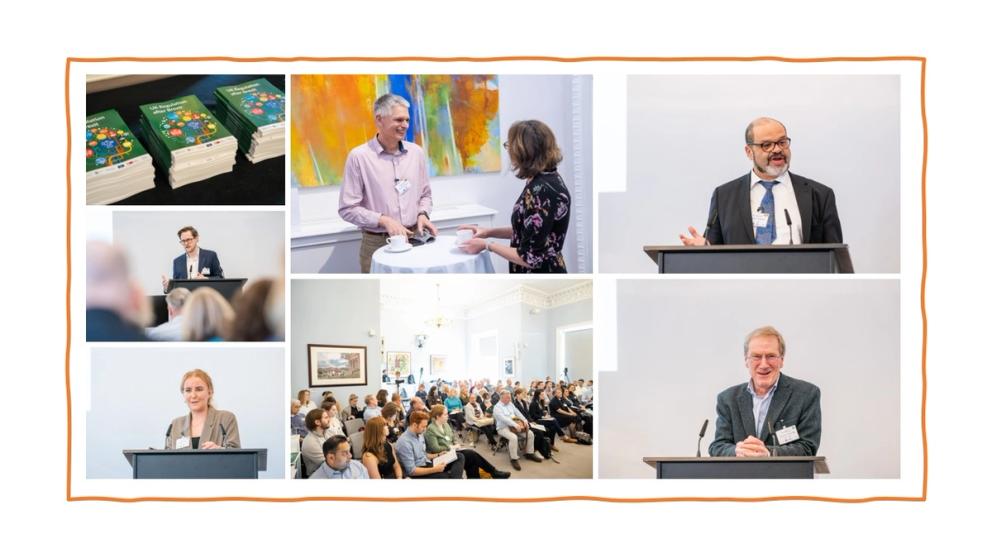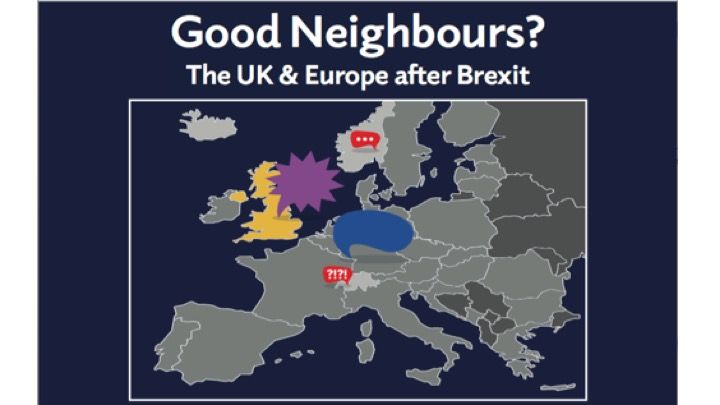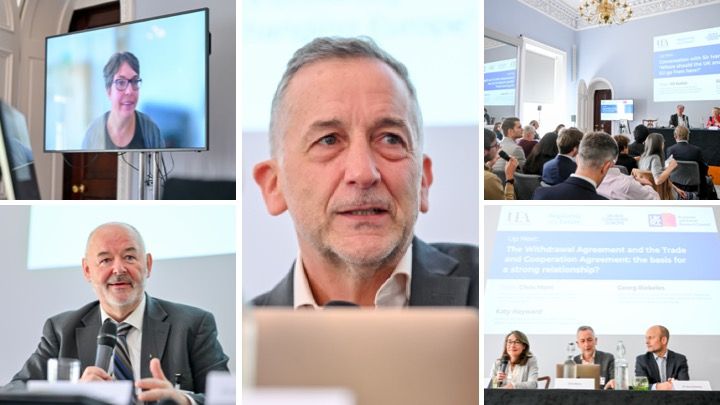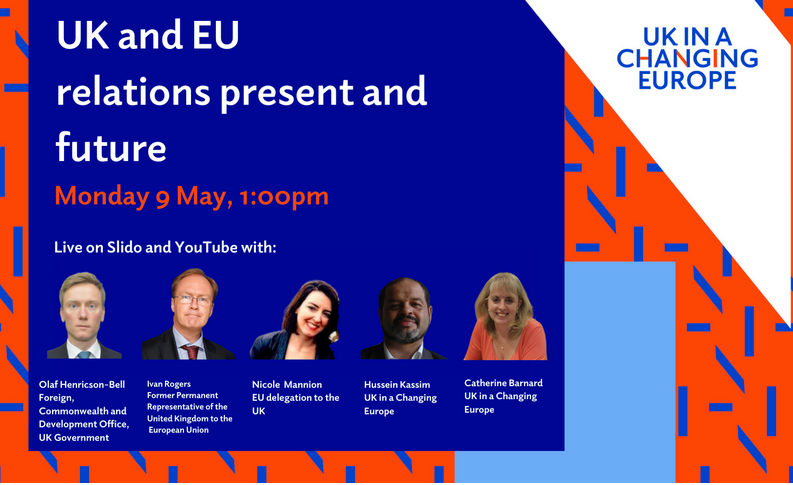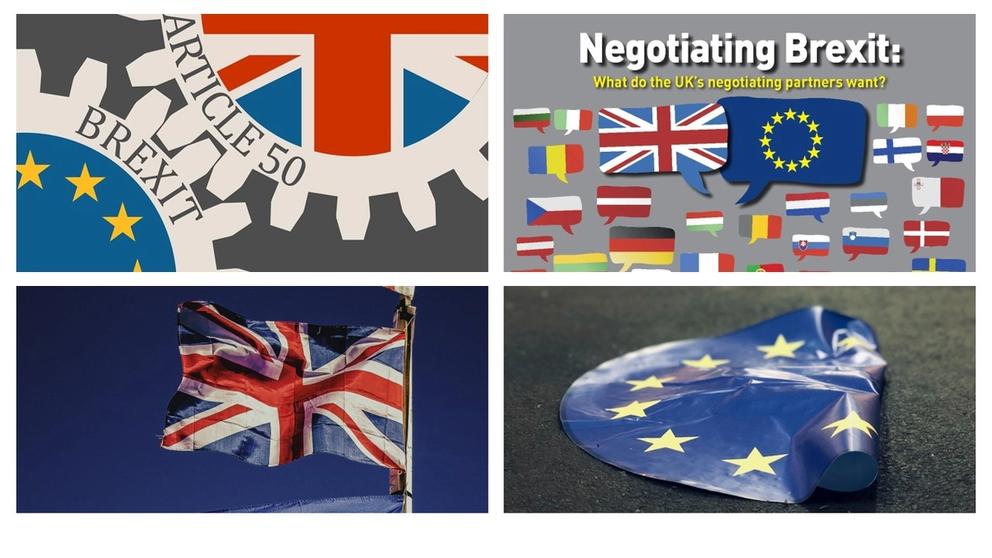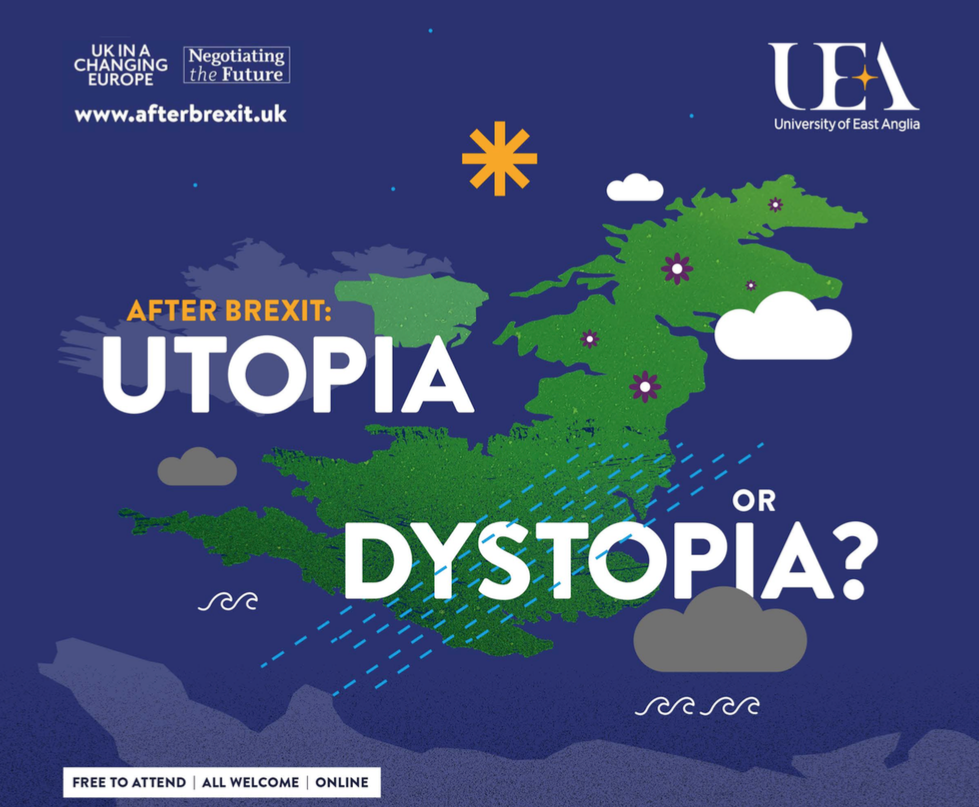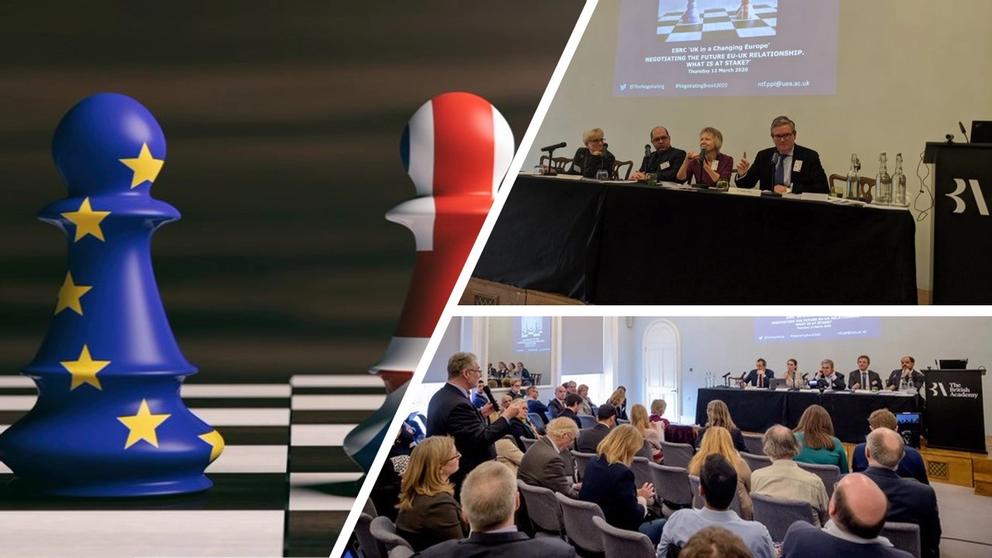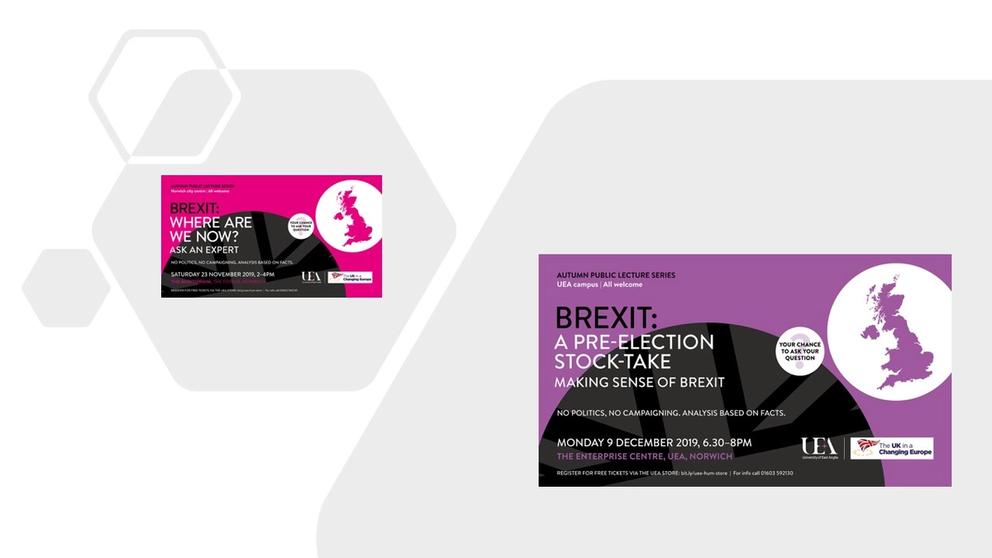Public Engagement: Events, Keynotes and Panels
Explore our past events and watch keynote speeches and panel discussions
UK Regulation after Brexit revisited Conference London 2022
UK Regulation after Brexit Revisited London 2022 videos
The ‘UK Regulation after Brexit revisited’ report with links to short videos from the conference held on 27 October at the British Academy in London
At the launch event for our report, guest speakers as well as number of contributors, examined the state of regulation and regulatory governance in the UK coming up to two years after the end of the transition period.
UK Regulation after Brexit revisited report
Hussein Kassim (University of East Anglia) opened the event with a short summary of the report’s key findings.
In his response, Matthew Holehouse, British correspondent of the Economist, considered how the opportunities afforded by Brexit could have been more fully explored and exploited by the UK.
Michael Keating (University of Aberdeen) and Lisa Claire Whitten (Queen’s University Belfast) then discussed how the transfer of regulatory responsibilities from the EU has been managed within the UK as a devolved polity. Focusing on Scotland and Wales, Michael considered the different approaches taken by governments in Edinburgh and Cardiff and their often tense relations with London. Lisa Claire discussed the Northern Ireland Protocol and the issues it raises in the context of an already complex regulatory history. The session was chaired by the Daniel Wincott (University of Cardiff).
In her keynote, Catherine Barnard (Cambridge University) examined the issues raised by the review of retained EU law. Catherine highlighted the pitfalls and dangers raised by the process, including the commitment to ‘sunsetting’ and the default setting of repeal. Brigid Fowler from the Hansard Society chaired the keynote.
Continuity and change in regulatory governance and the substance of regulation in key policy areas were examined in two panels. Carmen Hubbard (Newcastle University) discussed agriculture, David Bailey (University of Birmingham) manufacturing, and Sarah Hall (University of Nottingham) transport in the first panel, which was moderated by Paul Adamson, Chair of the EU-UK Forum.
In the second, Andreas Stephan (University of East Anglia) looked at competition policy, Amelia Fletcher (University of East Anglia) digital regulation, and Scott James (King’s College London) financial services. Cleo Davies (University of East Anglia) was the chair.
The final session, chaired by Andrew Jordan (University of East Anglia) examined changes in regulation of the environment. In his keynote, Mark Roberts from the Environmental Standards Scotland described how the regime in Scotland differs from England, especially as Scotland has decided to align closely with EU rules. Mark explained the powers and responsibilities of the new agency and outlined the challenges that confront it. In her keynote, Maria Lee (UCL) discussed the new UK regulatory regime and the rules that have been proposed for England. She highlighted the UK government’s post-Brexit plans that aim to reduce expert input, discount precedent, and expand ministerial discretion.
‘UK Regulation after Brexit revisited’ is a joint project of ‘Negotiating the Future’, the Centre for Competition Policy, and ‘Brexit & Environment’. It was convened by Hussein Kassim, Professor of Politics, ‘UK in a Changing Europe’ Senior Fellow, and PI of ‘Negotiating the Future’, Cleo Davies, Senior Research Associate ‘Negotiating the Future’, Sean Ennis, Professor of Competition Policy and Director of the Centre for Competition Policy, and Andrew Jordan, Professor of Environmental Policy, School of Environmental Sciences, University of East Anglia, and Co-chair ‘Brexit & Environment’.
Good Neighbours? The UK and Europe Conference London 2022
Good Neighbours? London Conference September 2022 Videos
22 September 2022, British Academy, London
UEA - UK in a Changing Europe - ESRC
The conference assessed the current state of the UK’s relationship with the EU, compared the UK’s relationship with the EU with Norway and Switzerland’s, and considered the prospects for EU-UK cooperation in security and foreign policy. It also looked at its bilateral relations with key European states.
The view from the EU: João Vale de Almeida, EU Ambassador to the UK
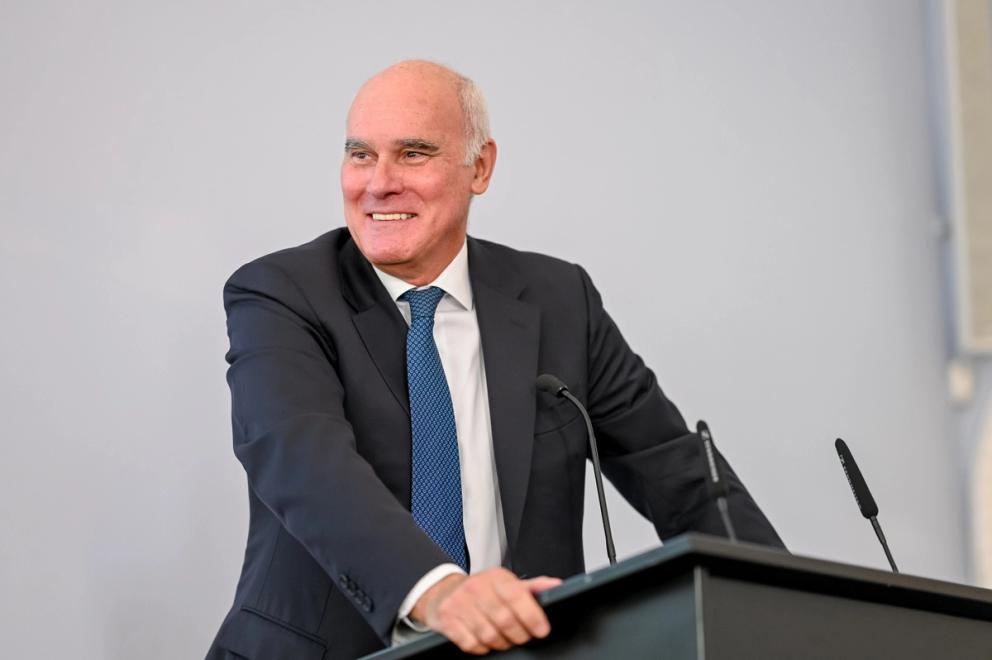
Chair: Hussein Kassim Professor of Politics, University of East Anglia and Senior Fellow ‘UK in a Changing Europe’
João Vale de Almeida, the EU Ambassador to the UK, opened the day, with an intervention that emphasized the importance of good EU-UK relations, but warned that any improvement would require a rebuilding of trust. The UK’s recognition of its obligations is a first requirement and the UK needs to implement the agreements which it negotiated and agreed.
The Withdrawal Agreement and the Trade & Cooperation Agreement: the basis for a strong relationship?
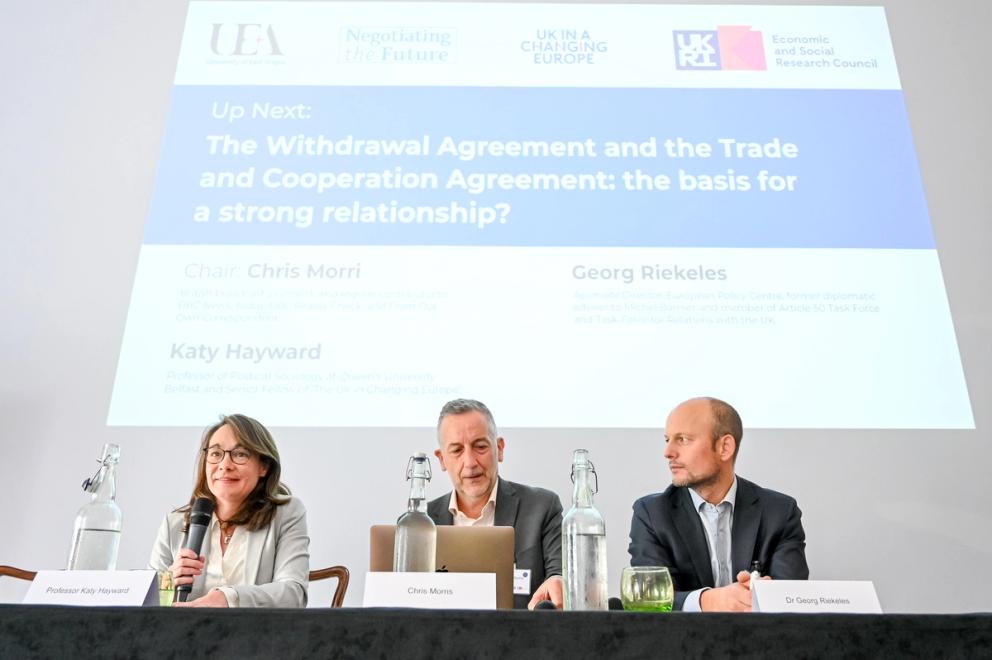
- Katy Hayward, Professor of Political Sociology at Queen's University Belfast and Senior Fellow, The UK in a Changing Europe
- Georg Riekeles, Associate Director, European Policy Centre, former diplomatic adviser to Michel Barnier and member of Article 50 Task Force and Task Force for Relations with the UK
Chair - Chris Morris, British broadcast journalist
With Chris Morris in the chair, Katy Hayward, Professor of Political Sociology at Queen’s University Belfast and Senior Fellow of ‘The UK in Changing Europe’, and Georg Riekeles, Associate Director, European Policy Centre, former diplomatic adviser to Michel Barnier and member of Article 50 Task Force and Task Force for Relations with the UK, then discussed whether the Withdrawal Agreement and the Trade and Cooperation Agreement provide the basis for a strong relationship.
The view from EU member states I
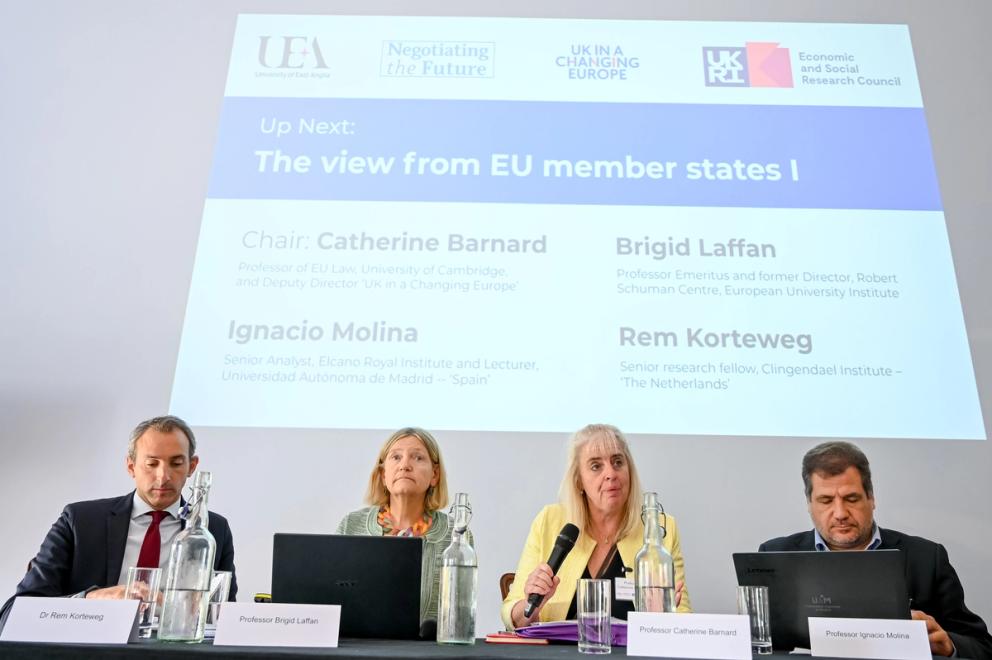
- Brigid Laffan, Professor Emeritus and former Director, Robert Schuman Centre, European University Institute
- Rem Korteweg, Senior research fellow, Clingendael Institute – ‘The Netherlands’
- Ignacio Molina, Senior Analyst, Elcano Royal Institute and Lecturer, Universidad Autónoma de Madrid - ‘Spain’
Chair: Catherine Barnard, Professor of EU Law, University of Cambridge, and Deputy Director ‘UK in a Changing Europe’
Brigid Laffan, Professor Emeritus and former Director of the Robert Schuman Centre at the European University Institute, Rem Korteweg Senior research fellow at the Clingendael Institute, and Ignacio Molina, Senior Analyst at the Elcano Royal Institute and Lecturer at Universidad Autónoma de Madrid discussed UK relations post-Brexit respectively with Ireland, the Netherlands, and Spain. Catherine Barnard, Professor of EU Law at University of Cambridge, and Deputy Director of ‘UK in a Changing Europe’ chaired the discussion
UK-EU relations in comparative perspective
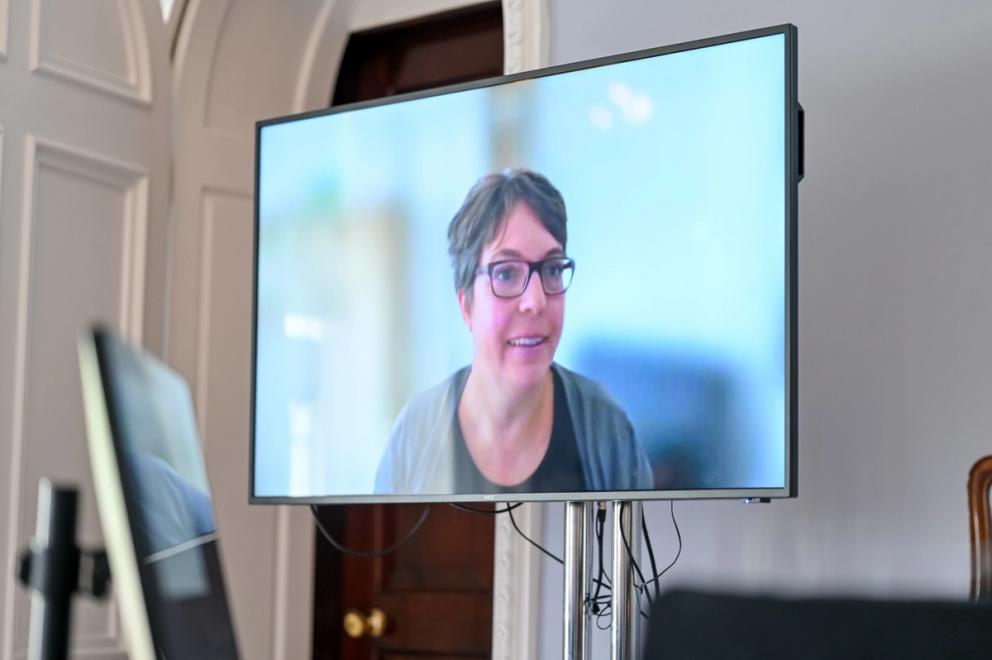
- Stefanie Walter, Professor of International Relations and Political Economy, University of Zurich
- John Erik Fossum, Professor of Political Science at ARENA Centre for European Studies, University of Oslo, and Scientific Coordinator of EU Differentiation, Dominance and Democracy
Chair: Catherine Barnard, Professor of EU Law, University of Cambridge, and Deputy Director ‘UK in a Changing Europe’
Stefanie Walter, Professor of International Relations and Political Economy, University of ZurichandJohn Erik Fossum, Professor of Political Science at ARENA Centre for European Studies, University of Oslo, discussed how UK relations with the EU compare with Norway and Switzerland.
Conversation with Sir Ivan Rogers: ‘Where should the UK and EU go from here?’
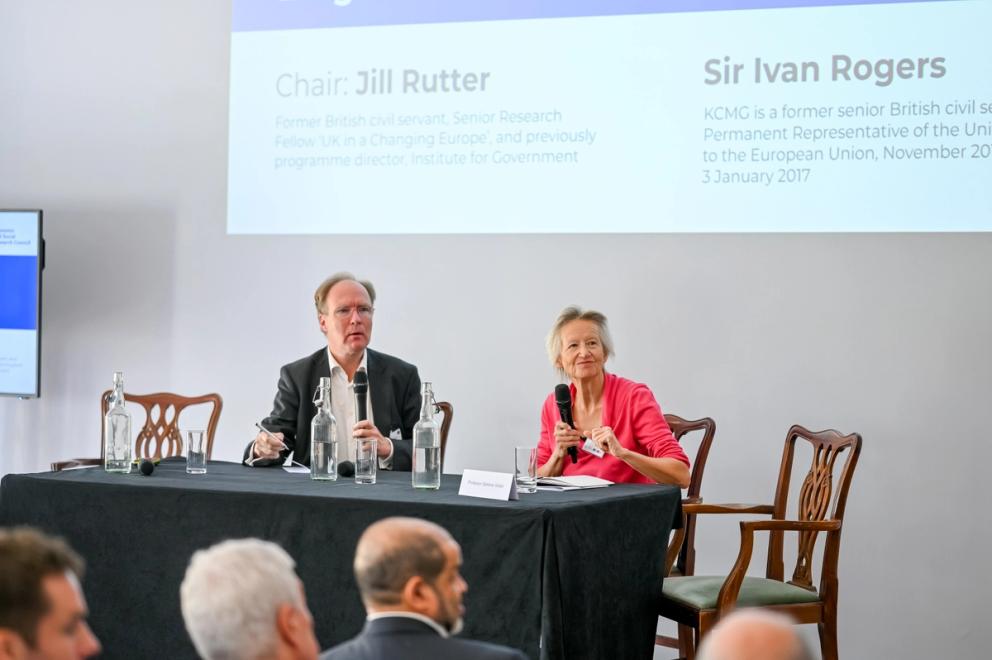
Chair: Jill Rutter, former British civil servant, Senior Research Fellow ‘UK in a Changing Europe’, and previously programme director, Institute for Government
Sir Ivan Rogers KCMG,a former senior British civil servant and Permanent Representative of the United Kingdom to the European Union between November 2013 and January 2017, in conversation with Jill Rutter, former British civil servant and Senior Research Fellow ‘UK in a Changing Europe’, reflected on where the UK and EU could go from here. Sir Ivan offered his views on the likely approach of the new prime minister, Liz Truss, against the background of her record as Foreign Secretary and in view of the domestic and party constraints she faces.
[Unrecorded] Conversation with Susannah Simon, Director, Europe Group, Foreign, Commonwealth and Development Office
Chair: Anand Menon, Professor of European Politics and Foreign Affairs, King's College London, and Director of ‘The UK in a Changing Europe’
The view from EU member states II
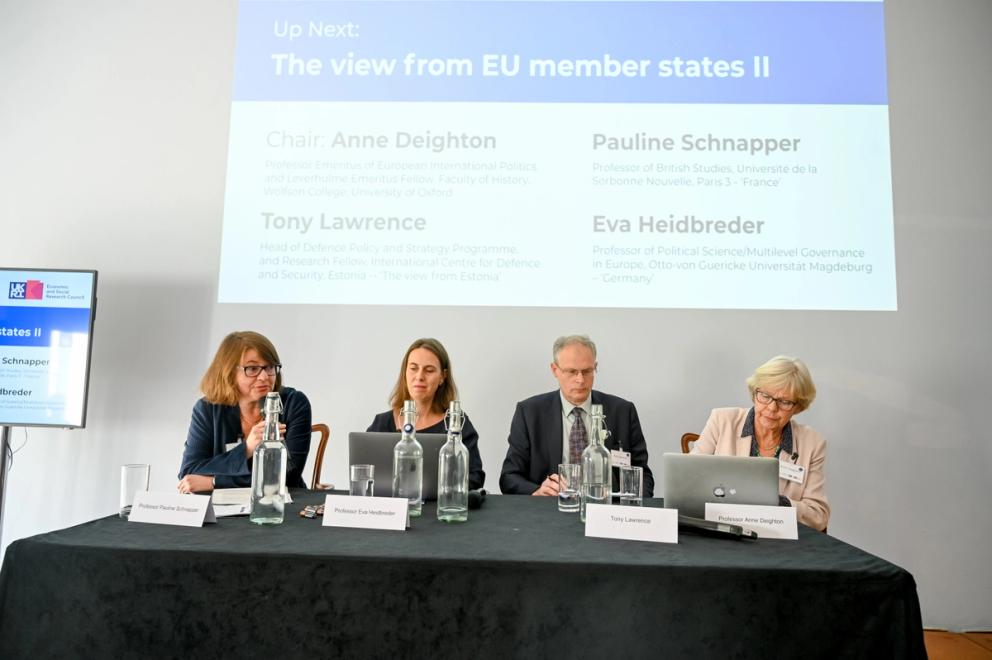
- Pauline Schnapper, Professor of British Studies, Université de la Sorbonne Nouvelle, Paris 3 - ‘France’
- Eva Heidbreder, Professor of Political Science/Multilevel Governance in Europe, Otto-von Guericke Universität Magdeburg – ‘Germany’
- Tony Lawrence, Head of Defence Policy and Strategy Programme, and Research Fellow, International Centre for Defence and Security, Estonia - ‘The view from Estonia’
Chair: Anne Deighton, Professor Emeritus of European International Politics, and Leverhulme Emeritus Fellow, Faculty of History, Wolfson College, University of Oxford
Pauline Schnapper, Professor of British Studiesat Université de la Sorbonne Nouvelle, Paris 3, Eva Heidbreder, Professor at the Otto-von Guericke Universität Magdeburg, and Tony Lawrence, Head of Defence Policy and Strategy Programme, and Research Fellow, International Centre for Defence and Security, discussed relations between the UK and France, Germany and Estonia respectively. The panel was chaired by Anne Deighton, Professor Emeritus of European International Politics, at the University of Oxford.
Future cooperation and future relations: security and migration
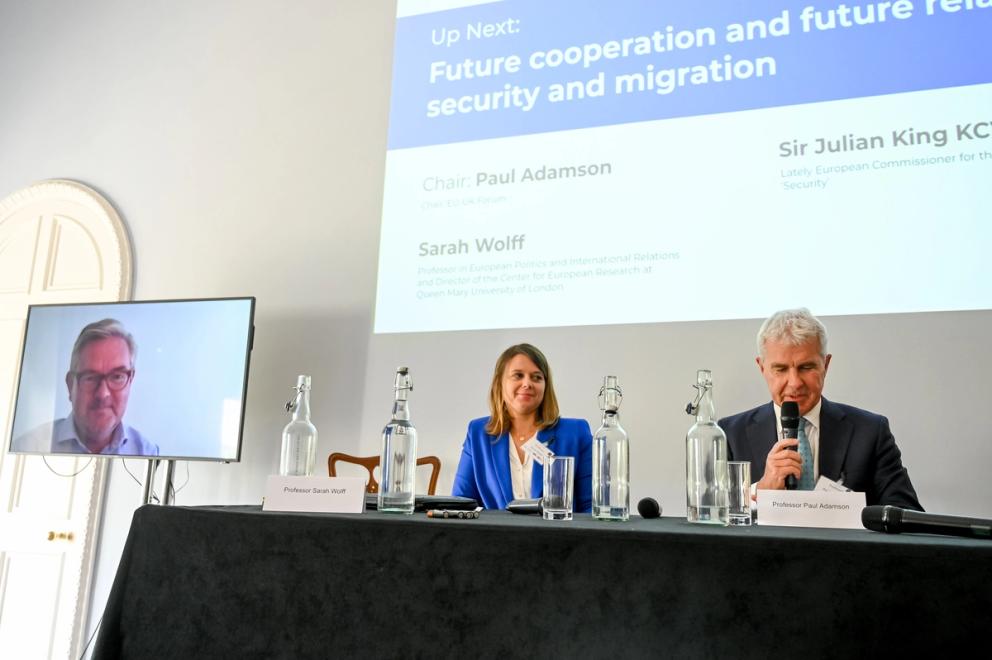
- Sir Julian King KCVO CMG, Lately European Commissioner for the Security Union – ‘Security’
- Sarah Wolff, Professor in European Politics and International Relations, Director of the Center for European Research at Queen Mary University of London
Chair: Paul Adamson, Chair, EU-UK Forum
Sir Julian King KCVO CMG, former European Commissioner for the Security Union and Sarah Wolff, Professor in European Politics and International Relations at Queen Mary University of London discussed future cooperation between the EU and UK in security and migration, with Paul Adamson in the chair.
Future cooperation and future relations: foreign policy, defence and trade
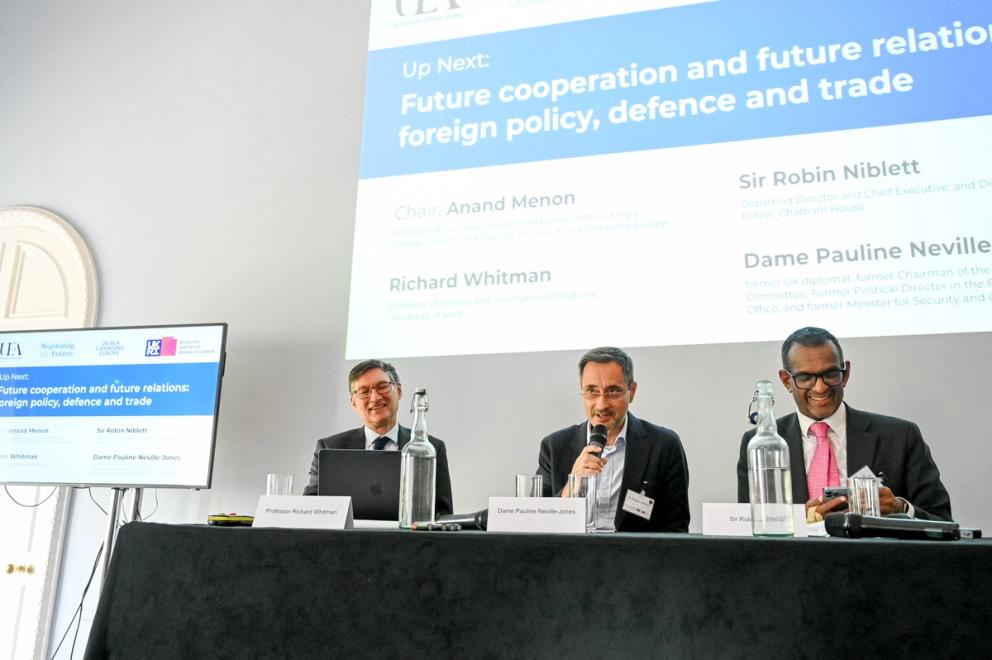
- Sir Robin Niblett, Departing Director and Chief Executive, and Distinguished Fellow, Chatham House
- Richard Whitman, Professor of Politics and International Relations, University of Kent
Chair: Anand Menon, Professor of European Politics and Foreign Affairs, King's College London, and Director of ‘The UK in a Changing Europe’
In the day’s closing session, Sir Robin Niblett, Departing Director and Chief Executive of Chatham House and Richard Whitman, Professor of Politics and International Relations at University of Kent concluded the day, discussing prospects for future cooperation between the EU and UK in foreign policy, defence and trade. The panel was chaired by Anand Menon, Professor at King’s College London, and Director of ‘UK in a Changing Europe’
The conference was an‘Negotiating the Future: the UK’s re-positioning in Europe’ event. The project led by Hussein Kassim, Professor of Politics, UEA and ESRC Senior Fellow, Dr Cleo Davies is senior research associate and Dr Pippa Lacey administrative assistant.‘Negotiating the Future: the UK’s re-positioning in Europe’ is funded by the UK Economic and Social Research Council as part of ‘The UK in a Changing Europe’ programme.
Past Events
UK in a Changing Europe Event 9 May 2022
- Ivan Rogers, former British Permanent Representative to the EU
- Olaf Henricson-Bell, Europe Director, Cabinet Office, UK Government
- Nicole Mannion, Deputy Head of Delegation, EU Delegation to the United Kingdom
- Hussein Kassim, Senior Fellow, UK in a Changing Europe
- Catherine Barnard, Deputy Director, UK in a Changing Europe
- Chair: Jill Rutter, Senior Researcher, UK in a Changing Europe
After Brexit: Utopia or Dystopia? Lecture Series 2021
Now that the UK has left the EU, what role should it play in the world? What is ‘Global Britain’, and is it a realistic project after the Covid-19 pandemic? What kind of relationship should the UK seek with its European neighbours? How serious are the tensions between England, Wales, Scotland and Northern Ireland on the question of the UK’s future relationship with the EU, and do they threaten the union?
In this online lecture series, leading figures from politics and academia share their reflections, and offer their hopes and fears.
27 April 2021, 6:30 – 8:00pm
Daniel Hannan, Baron Hannan of Kingsclere (Author, Conservative peer, and former MEP. He serves as adviser to the UK Board of Trade and is President of the Initiative for Free Trade)
An epidemic flicks switches in our brains, making us warier, more introverted, more protectionist. We will emerge from the lockdowns into an altogether more pinched and authoritarian world. What does that mean for an internationally connected, commercial country like Britain?
Chaired by Professor Alan Finlayson, Professor of Social and Political Theory, UEA.
11 May 2021, 6:30 – 8:00pm
John Bruton, Former Taoiseach (Prime Minister) of Ireland, former Fine Gael party leader, and former EU Ambassador to the US
This talk places Brexit in the context of the last 1000 years of relationship between Ireland and Britain, and between Britain and continental Europe. The UK was originally a multinational organisation, but is losing that characteristic as it focuses increasingly on sovereignty and identity, concepts which, of their very nature, divide peoples and create borders between them.
Chaired by Professor Hussein Kassim, Professor of Politics, UEA
The UK’s relationship with the EU has been an increasing source of tension between the four nations since the 2016 referendum. This panel looks at views from Scotland, Wales and Northern Ireland on how relations with the EU should develop, and considers whether the devolved settlement as currently configured is under threat. In the 2021 lecture series ‘After Brexit: Utopia or Dystopia?’, leading figures from politics and academia shared their reflections, and offered their hopes and fears for post-Brexit Britain.
Panelists: Nicola McEwen, David Phinnemore and Dan Wincott.
Chair: Hussein Kassim
This lecture looks at Britain and the British empire as a global hegemon in the late 19th and early 20th centuries, the policy choices and debates before Britain then, the disappearance of empire and the diminishing of British power after 1945, the legacies of empire on British thinking and policies, and what Global Britain may mean today.
Speaker: Margaret MacMillan CC CH, Professor of History, University of Toronto, and Professor of International History, University of Oxford
Chair: Emma Griffin, Professor of Modern British History, University of East Anglia
Speaker Dominic Grieve QC PC is a British barrister, President of the European Movement, and former Conservative politician. He served as Shadow Home Secretary from 2008 to 2009 and Attorney General for England and Wales from 2010 to 2014, and was Member of Parliament for Beaconsfield between 1997 and 2019. He campaigned against Leave, strongly opposed a no deal Brexit, and sought to prevent the prorogation of Parliament by Boris Johnson. In the 2021 lecture series ‘After Brexit: Utopia or Dystopia?’, leading figures from politics and academia shared their reflections, and offered their hopes and fears for post-Brexit Britain.
Chair: Hussein Kassim
London Conference 2020
London conference 2020
12 March 2020, British Academy, London
UEA - UK in a Changing Europe - ESRC
A one-day conference that brought together expert commentators to assess what is at stake in the second phase of EU-UK negotiation, to examine the positions of key actors and to contemplate what lies beyond.
Held just before events were cancelled due to the Coronavirus, this conference examined key issues relating to the negotiations on future relations. Edited videos of the keynotes and panels can be accessed below.
The conference opened with Sir Ivan Rogers, former UK ambassador to the EU, in conversation with Anand Menon, Director of ‘The UK in a Changing Europe’. Sir Ivan reflected on his experiences as former UK representative and adviser, and offered his analysis of current predicaments.
Watch the panel
Fabian Zuleeg, Chief Executive of the Brussels-based think-tank, the European Policy Centre, then discussed the EU’s approach, reflecting in particular on relations between member governments of the EU27 and the EU institutions (above with Jill Rutter).
Watch the keynote
In the first panel, Baroness Pauline Neville-Jones, former career UK civil servant and former chair of the Joint Intelligence Committee, discussed Defence and Foreign Policy. Rob Singh, Professor of US Politics, Birkbeck, University of London, offered a pessimistic analysis of future UK-US relations in the context of Brexit. Sir Julian King, former European Commissioner, discussed Security. The panel was chaired by Jill Rutter, ESRC Senior Fellow, ‘The UK in a Changing Europe’.
Watch the panel
The perspectives from Paris, Berlin, Dublin and The Hague were considered by Christian Lequesne, Professor of European Politics and Director of CERI, Science Po Paris, Eva Heidbreder, Professor of Political Science and Multilevel Governance in Europe, Otto-von Guericke Universität Magdeburg (above), Tony Connelly, Europe Editor for RTÉ News and Current Affairs, and Rem Korteweg, Senior Researcher at the Clingendael Institute. The panel was chaired by Hussein Kassim, ESRC Senior Fellow.
Watch the panel
Panel three addressed Trade and the Economy.
Meredith Crowley, Reader in International Economics at the University of Cambridge and ESRC Senior Fellow discussed core Trade issues, David Bailey, Professor of Business Economics at Birmingham Business School, and Senior Fellow outlined the challenges to UK Manufacturing, Jonathan Portes, Professor of Economics and Public Policy at King's College, London looked at the implications of the future relationship for the UK economy, and Katy Hayward, Reader in Sociology, Queen's University Belfast and ESRC Senior Fellow considered the Irish border.
The panel was chaired by John Peet, Political and Brexit Editor of the Economist.
Watch the panel
In her intervention, Catherine Barnard, Professor of EU Law and Employment Law, University of Cambridge and ESRC Senior Fellow discussed issues relating to EU citizens in the UK. Heather Rolfe, Director of Research, Demos, chaired the keynote.
Watch the keynote
The theme of the final panel was Regulation. In a pre-recorded presentation, Kenneth Armstrong, Professor of European Law at the University of Cambridge, gave an overview of the implications of the negotiations for Regulation and Regulatory architecture in the UK. Charlotte Burns, Professor of Politics at the University of Sheffield discussed Environmental policy. The panel was chaired by Hussein Kassim, ESRC Senior Fellow.
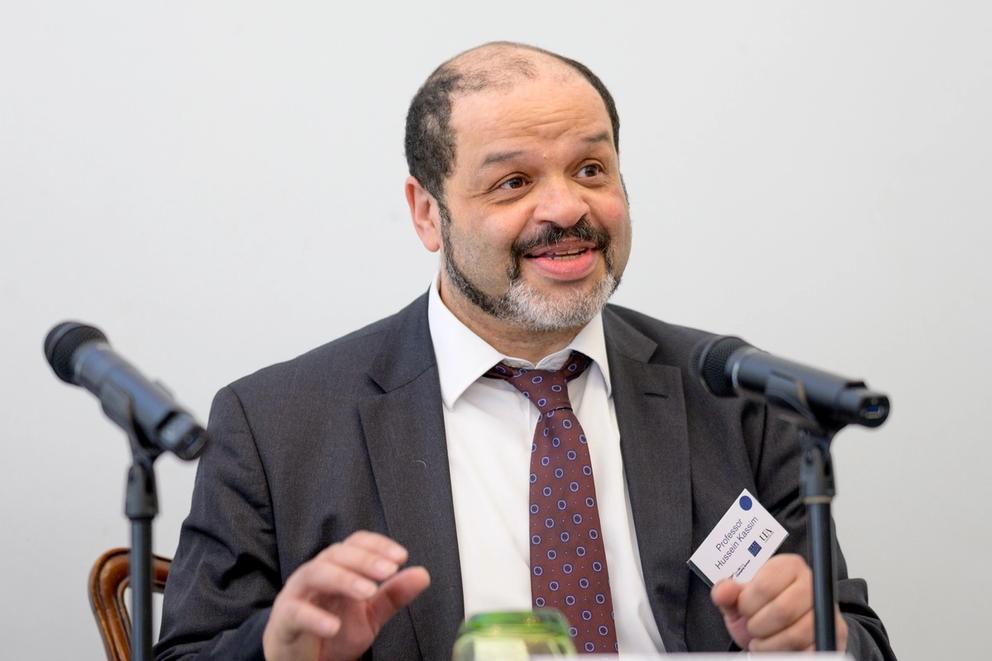

Norwich public events 2019
Norwich public events 2019
UEA 9 December 2019
Panellists at the event on 9 December 2019 at The Enterprise Centre, University of East Anglia, included:
- Professor Sir John Curtice, University of Strathclyde and ESRC Senior Fellow ‘UK in a Changing Europe’
- Jill Rutter, ESRC Senior Fellow ‘UK in a Changing Europe’ and formerly Institute for Government
- Allie Renison, Head of EU and Trade Policy, Institute of Directors
- Dr Nikos Skoutaris, School of Law, UEA, and
- Professor Hussein Kassim, School of Politics, Philosophy, Language and Communication Studies, UEA and ESRC Senior Fellow ‘UK in a Changing Europe’.
The panel was chaired by Annabelle Dickson, Political Correspondent, Politico.
Topics covered included: trade and future ‘red tape’ within the UK and between the UK and the EU, the civil service, the Irish border, the domestic debate about Brexit in the UK, and the perspective from Brussels.
The event was reported by BBC Look East on 9 December 2019.
Saturday 23 November 2019, The Forum, Norwich
Two events, organised by Professor Hussein Kassim under his Senior Fellowship under the ‘UK in a Changing Europe’ programme, offered the chance for people from Norwich and Norfolk the opportunity to put their questions to a panel of independent experts.
The event featured:
- Professor Catherine Barnard, University of Cambridge and ESRC Senior Fellow at The UK in a Changing Europe
- Professor Andrew Jordan, School of Environmental Sciences, University of East Anglia
- Dr Nikos Skoutaris, School of Law, UEA
- Professor Hussein Kassim, School of Politics, Philosophy, Language and Communication Studies, UEA and ESRC Senior Fellow ‘UK in a Changing Europe’.
The panel was chaired by Annabelle Dickson, Political Correspondent, Politico.
Topics covered included: immigration, democracy and referendums, the Irish border, the quality of the domestic debate, and the perspective from the EU27.
Past events 2017
British Academy, London
20 October 2017
Anand Menon offers his reflections on the state of the negotiations.
Session is chaired by Allegra Stratton, National Editor ITV News
Sefaan De Rynck, Chief Adviser to the EU Negotiator, Michel Barnier, offers his assessment of the Article 50 negotiations. Note: Chatham House rules can be disregarded in the case of this video.
A leading authority on EU law, Jean-Claude Piris, Legal Counsel of the Council of the EU and Director General of its Legal Service from 1988 to 2010, outlines the limited options available to the UK.
Former Foreign Secretary, Sir Malcolm Rifkind QC, looks at the options facing the May Government. A former remainer, he argues that Brexit reflects the will of the British people and must be followed through. The BBC's Christian Fraser is in the chair.
Panel 1 The European Institutions
Hussein Kassim discusses the approach of the European Council and the European Commission to Brexit. Allegra Stratton, National Editor of ITV News, is in the chair.
Panel 2 France, Germany, and Luxembourg
Professors Christian Lequesne, Eva Heidbreder and Anna-Lena Hoegenauer discuss how France, Germany and Luxembourg are approaching the Article 50 negotiations.
Panel 3: Ireland, the UK, Spain and Greece
Professor Brigid Laffan, Dr Salvador Llaudes, Professor Calliope Spanou, and Dr Simon Usherwood discuss how Ireland, Spain, Greece, Luxembourg, and the UK are approaching the Article 50 negotiations and how they view Brexit and its likely impact. Denis Staunton, London editor of The Irish Times is in the chair.
Panel 4: Hungary, Poland, and the Czech Republic
Dr Robert Csehi, Dr Natasza Styczyńska and Dr Petr Kaniok discuss how Hungary, Poland and the Czech Republic are approaching the Article 50 negotiations and their views on Brexit and its likely consequences. Dr Christine Res, UCL, is in the chair.
‘Brexit Means Brexit’: The UK’s Future Outside the EU
1. The Future of the UK 19 January 2017
Q&A Session
2. ‘Brexit Means Brexit’: The UK’s Future Outside the EU
16 February 2017
Professor Eric Kaufmann, Birkbeck, University of London, discusses Brexit and the Future of Community Relations as part of UEA's series ''Brexit means Brexit', but what does that mean', convened by Professor Hussein Kassim, UEA
Sunder Katwala, Director of British Futures, discusses Brexit and the future of community relations as part of UEA's series ''Brexit means Brexit', but what does that mean', convened by Professor Hussein Kassim, UEA
Professor Adrian Favell from the University of Leeds discusses Brexit and the Future of Community Relations as part of UEA's series ''Brexit means Brexit' but what does that mean', convened by Professor Hussein Kassim, UEA
The Future of Community Relations Q&A Session with Professor Eric Kaufmann, Mr Sunder Katwala and Professor Adrian Favell
3. 'Brexit Means Brexit’: The UK’s Future Outside the EU
The Future of Migration and Immigration and Brits Abroad
9 Feb 2017
The Rt Hon Charles Clarke, Visiting Professor at UEA, discusses immigration, migration and UK expats in other EU member states, as part of UEA's series ''Brexit means Brexit', but what does that mean'
Dr Heather Rolfe, Assistant Director at the National Institute of Economic and Social Research, discusses Immigration, Migration and UK expats in other EU member states, as part of UEA's series ''Brexit means Brexit', but what does that mean'
Dr Heather Rolfe, Assistant Director at the National Institute of Economic and Social Research, and the Rt Hon Charles Clarke, Visiting Professor at UEA in Q&A on Immigration, Migration and UK expats in other EU member states, as part of UEA's series ''Brexit means Brexit', but what does that mean'
4. ‘Brexit Means Brexit’: The UK’s Future Outside the EU
The UK’s International Future
2 February 2017
Professor Alan Finlayson, UEA, discusses the ideas shaping the UK's approach to Brexit and the UK's international future in a post-Brexit world
Professor Thomas Otte, UEA
Professors Finlayson and Otte answer audience questions on wide-ranging issues from future UK policy to Russia to the Middle East, and the influences on UK foreign policy

